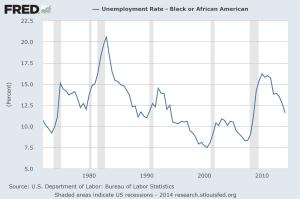The country awaits the 9 p.m. decision tonight by a Missouri grand jury on whether to indict a white police officer, Darren Wilson, for the killing of a black youth, Michael Brown. Passions have been inflamed since Mr. Brown’s death, and a decision not to indict is widely feared to lead to further unrest.
There have been two narratives put forward in this tragedy. First, the story that initially came out was that an unarmed black teenager was trying to surrender with hands raised and he was killed by a cop. A second narrative arrived a few days later, complete with video: a large (6’4″, ~300 lb) young man roughed up a convenience store owner, then subsequently was involved in an altercation with an officer, and in a struggle for the officer’s weapon, was shot and killed.
As we await the decision by the grand jury, many Americans have chosen their particular narrative of what happened. If the leaks are to be believed, the 2nd narrative favoring the officer, is largely true, such that Officer Wilson is expected to not be indicted, and therefore, police and the community are expecting a potential riot.
The point of this post is to think differently about this, because if we reflect on which narrative is true, it will continue to divide us, and worse, cause us to miss the larger picture that will continue to allow Fergusons in our future. Regardless of which narrative is true, or something more in the middle, the tragedy is that tonight a young man is dead. Someone created in the image of God, with a life born full of potential, is gone. I don’t know the circumstances of Mr. Brown, but I feel certain that 18 years earlier, his mother would look at her newborn son and have hopes for what his life would bring–all those hopes are now gone, in a brief moment in time.
How did it get to this? The reasons for problems with urban African-American youth are multiple and complex: no one will doubt the breakdown of the two-parent family is a significant problem for all racial groups, but nowhere more pronounced than with African-Americans (~70% of births were out-of-wedlock in 2012). There are significant negative implications for the nation’s war on drugs, which has resulted in far more young black males being sent to prison than whites. Then there are poorer schools in most urban environments, etc. I’m not a sociologist so I’ll stop here–this is just to suggest its a complex problem which requires a multi-faceted solution.
I’d like to suggest that a trip into Ferguson history may shed some light on one aspect of the problem–the economics which drive part of this problem. I encourage all of you to read one view of the history of Ferguson MO and the Corvette
It’s easiest to blame the local politicians. When Kentucky pitched GM an outstanding tax package to steal away Corvette production, St. Louis auto workers marched down to City Hall and plead for a counterproposal until the eleventh hour. They were ignored. Those 1200 or so workers were supposed to simply migrate to a new plant in nearby suburban Wentzville, but when that facility’s opening was delayed, a horde of UAW members stunned everyone by exercising their union relocation clause. In the summer of 1981, nearly 1000 St. Louis auto workers left for Kentucky.
It wasn’t as much the sheer volume as it was the abruptness. These people voted. They owned homes. They were skilled, organized and most importantly, hired from within the community. They had pull.
The Corvette’s departure is a chronological marker, if not a turning point, for numerous North County communities that have since witnessed an exodus of hope. More manufacturing jobs disappeared soon after. Carter Carburetor closed its doors on 3000 employees. Ford’s factory closure axed 2500 workers. And, for many, the promise of social mobility evaporated. Turnouts at local elections fell off. Real estate values dropped. The area’s racial composition, once broad, became skewed. And tense. Revenue from local businesses dwindled as they were shuttered and replaced by exploitive conglomerate outposts.
One of the salient issues that affects many urban areas and the youth that come out of them is how powerless they feel to affect their future–there is a lack of hope, for many complex reasons. While hopelessness does not dominate, it is a factor. When we think of what is necessary for those in poverty to succeed in the rest of the world, we commonly think of providing sufficient food, clothing, housing and education as a way to move up. Indeed, many of the readers of this blog are either supporters or at least aware of programs such as Compassion, World Vision, etc., where children are helped with those necessary essentials. And this model does seem to work. Yet Michael Brown had all that. And it was not enough.
***********************
What makes for hope? Of course, at a spiritual level, we hope in a sovereign God who works everything out for our good. But in a physical sense, most of us hope of improved conditions in the future: better economic prospects, happy social relationships, good living arrangements. But many of these physical things that we hope for are either directly or indirectly related to a good job. The Corvette factory move illustrates how vital jobs are to a community, and how lack of work is destructive to the hopes than many of those marginalized.
Bereans should not be surprised at this; beyond the material income that enables the hopes described above, work is part of who we were created to be. Indeed, work is part of shaping our identity and who we are. Work is present before the fall in the Garden of Eden. Early narratives of men in Genesis included their occupation as a prime descriptor of who they were (e.g., Tubal-cain, a forger of all instruments of bronze and iron). We were created to work, and when honorable work that utilizes the gifts God has given us are not available, it is easy not to have hope.
In inner cities across America, we have similar stories. Chicago is perhaps the worst, and we have many more deaths. Since just the 1st of November, 26 people have died, most of them young black men. We don’t care about them. They’re not in the press, so there is no focus on the incredible tragedy of their deaths. Many are victims of gang violence, often black-on-black. Those “normal” killings are not sensational–there is no White/Black racial element to trumpet and so these people are forgotten. Johnathan Cartwright was also 18, just like Michael Brown, and is suspected of being killed as part of a gang shootout. We don’t know anything about his family. But there is somebody who’s heart is ripped out by the pain of his death and the life that could have been. But we don’t notice–he’s not on the news. Lydell Lynch was just 22 years old, and was shot multiple times in his apartment. Somewhere he has a family, and their tears are just as pained as Michael Brown’s family, but we don’t notice because its not a racial thing. And then there are those we really don’t know: a young man who has not been identified was killed in a vehicle from multiple gun shots. We don’t even know his name, and we’re not sure anyone really cares.
The point of this is that there are blights throughout this country, with tragedies literally happening daily, and we don’t seem to notice. We just move on, as if there is nothing that can be done in Chicago, or in Philadelphia, or in Ferguson MO, or in Beavercreek Ohio. The reality is there are Ferguson’s all around us waiting to explode; indeed they are exploding but we only notice when the press suggests its really important, like when it could represent a racial incident. As if 26 young men dying in Chicago in less than a month is not something to care about.
****************************************************************************
As we said above, this is an incredibly complex problem and there are certainly many parts of solution needed. But part of our focus here at Bereans at the Gate on economics is thinking about how we create opportunities for those that are marginalized the most. Its one of the reasons that we so deplore politicians talking about raising the minimum wage, when it hurts low-skilled youth the most; after the last minimum wage hike into the teeth of the great recession, teen-age African-American youth unemployment hit ~50%. Do we really care about people when we make it harder to employ them?
Beyond the numerous good reasons to object to the Affordable Care Act, perhaps the worst feature of it is its tax on employment, raising the cost of individual workers and condemning large numbers of our population to part time work. Again, we need to understand that work is an essential part of human dignity–to make work more difficult to obtain is ripping out an essential part of humanity. And what we see is that we each don’t lose a small part of who we are in work–most of us keep our jobs. But some of us lose this aspect altogether, because policies will keep them from working at all.
When we demand serious cost/benefit analysis of regulations, or demand that the Keystone pipeline be built after years of analysis showing that there is no appreciable increase in pollution, and–while the exact number is debatable–there are good jobs to be had in its near term construction and its long term processing of oil, we are calling for opportunity for all.
When we call for corporate tax reform to make our domestic production more competitive and make the U.S. a great place to repatriate foreign earnings, its a call to make more opportunities for people to work.
These aren’t solutions for all of the inner city problems, but they are solutions for part. I’ll still point to the data–a rising tide does lift all boats, at least to a degree. Maybe it will lift just a few young men in Chicago…maybe there won’t be a gang member from Garfield Park killed, because somehow he got out and found a job in a growing economy waiting for him.


 Bert Wheeler
Bert Wheeler
 Jeff Haymond
Jeff Haymond
 Marc Clauson
Marc Clauson
 Mark Caleb Smith
Mark Caleb Smith
 Tom Mach
Tom Mach